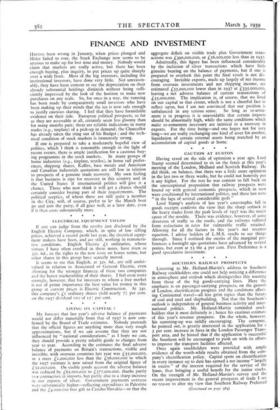LIVING ON CAPITAL ?
My forecast that last year's adverse balance of payments would not differ materially from that of 1937 is now con- firmed by the Board of Trade estimates. Nobody pretends that the official figures are anything more than very rough approximations, but if we can assume that they are not influenced by " national considerations," as I hope we can, they should provide a pretty reliable guide to changes from year to year. According to the estimates the final adverse balance of payments on Britain's transactions, visible and invisible, with overseas countries last year was ‘55,000,000, or a mere £1,000,000 less than the £56,000,000 to which the 1937 estimate is now raised from the original figure of £52,000,000. On visible goods account the adverse balance was reduced by £65,000,000 to £377,000,000. thanks partly to a contraction in imports, but partly also to a sharp increase in our exports of silver. Government payments overseas were substantially higher—reflecting expenditure in Palestine and the £4.000,000 free gift to Czecho-Slovakia—so. that the aggregate deficit on visible trade plus Government trans- actions was £390,000,000, or £56,000,000 less than in 1937.
Admittedly, this figure has been influenced considerably by the inclusion of silver transactions which have little genuine bearing on the balance of payments, but if one is prepared to overlook this point the final result is not dis- couraging. Invisible exports, made up largely of net income from overseas investments and net shipping income, are estimated £55,000,000 lower than in 1937 at £335,000,000, leaving a net adverse balance of current transactions of £55000,000. The implication is, of course, that we lived on our capital to that extent, which is not a cheerful fact to reflect upon, but I am not convinced that our position is unbalanced in any serious sense. So long as re-arma- ment is in progress it is unavoidable that certain imports should be abnormally high, while the same conditions which make re-armament necessary are inimical to a recovery in exports. For the time being—and one hopes not for very long—we are really exchanging one kind of asset for another, liquidation of certain external assets being matched by an accumulation of capital goods at home.


























































 Previous page
Previous page